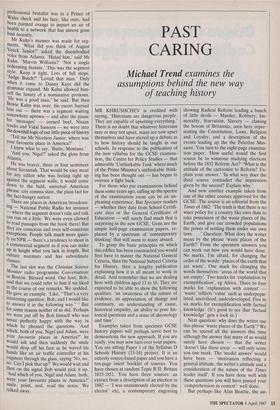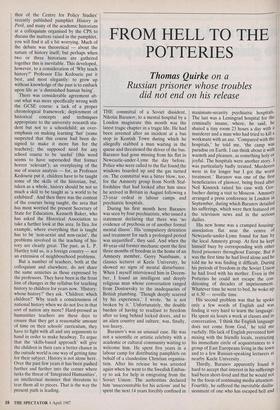PAST CARING
Michael Trend examines the
assumptions behind the new way of teaching history
MR KHRUSHCHEV is credited with saying, 'Historians are dangerous people. They are capable of upsetting everything.' There is no doubt that whatever historians may or may not upset, many are now upset themselves and have stirred up a debate as to how history should be taught in our schools. In response to the publication of the new syllabus for the GCSE examina- tion, the Centre for Policy Studies — that admirable 'Unthinkable Tank' where much of the Prime Minister's unthinkable think- ing has been thought out — has begun to oversee a fight back. For those who put examinations behind them some years ago, calling up the spectre of the examination room can be an un- pleasing experience. But Spectator readers — whether they date from School Certifi- cate days or the General Certificate of Education — will surely find much that is surprising in the new GCSE. Gone are the simple half-page examination papers, re- placed by a spectrum of 'contemporary thinking' that will seem to many absurd.
To grasp the basic principles on which this edifice has been constructed you would first have to master the National General Criteria, then the National Subject Criteria for History, then a lengthy publication explaining how it is all meant to work in detail. And remember that we are dealing here with children aged 13 to 16. They are expected to be able to show the following qualities: 'an awareness of the nature of evidence, an appreciation of change and continuity, an understanding of cause, historical empathy, an ability to pose his- torical questions and a sense of chronology and time'.
Examples taken from specimen GCSE history papers will perhaps serve best to demonstrate the new approach. If you are ready, you may now turn over your papers. You are sitting Paper 1 of the Syllabus D Schools History (13-16) project. It is an entirely source-based paper and you have a ten-page insert booklet of sources. You have chosen at random Topic B II: Britain 1815-1851. You have three sources: an extract from a description of an election in 1802 — 'I was unanimously elected by the elector' etc; a contemporary engraving showing Radical Reform leading a bunch of little devils — Murder, Robbery, Im- morality, Starvation, Slavery — clawing the bosom of Britannia, seen here repre- senting the Constitution, Laws, Religion and Loyalty; and a description of the events leading up the the Peterloo Mas- sacre. You turn to the eight-page examina- tion paper. 'How useful would the first source be to someone studying elections before the 1832 Reform Act?` What is the attitude of the cartoonist to Reform? Ex- plain your answer.' In what way does the third source contradict the impression given by the second? Explain why.'
And now another example taken from one of the other courses approved for the GCSE. The source is an editorial from the Times of 1862: 'The truth is that there is no wiser policy for a country like ours than to take possession of the waste places of the Earth, and give our crowded populations the power of settling them under our own laws . . .' Question: What does the writer mean by the phrase 'waste places of the Earth?' From the specimen answers you can work out how you would have done. No marks, I'm afraid, for changing the order of the words: 'places of the earth that are waste'. One mark for changing the words themselves: 'areas of the world that are empty'. Two marks for 'explanation by exemplification', eg Africa. Three to four marks for 'explanation with context' 'waste' reflects 'value' such as underpopu- lated, uncivilised, underdeveloped. Five to six marks for exemplification with factual knowledge. (It's good to see that 'factual knowledge' gets a look in.) Next question: why does the writer use this phrase 'waste places of the Earth'? We can be spared all the answers this time although the answer that many of us would surely have chosen that the writer `doesn't like these areas' — will only score you one mark. The 'model answer' would have been — 'motivation reflecting a general attitude, the writer's attitude and a consideration of the nature of the Times leader itself. If you have done well with these questions you will have passed your `comprehension in context': well done.
But perhaps like Alan Beattie, the au- thor of the Centre for Policy Studies' recently published pamphlet History in Peril, and many of the academic historians at a colloquium organised by the CPS to discuss the matters raised in the pamphlet, you will find it all a bit worrying. Much of the debate was theoretical — about the nature of history itself; but perhaps when two or three historians are gathered together this is inevitable. This developed, however, to a consideration of 'Why teach history?' Professor Elie Kedourie put it best, and most elegantly: to grow up without knowledge of the past is to embark upon life as 'a diminished human being'.
There was considerable agreement ab- out what was more specifically wrong with the GCSE course: a lack of a proper chronological framework; deployment of historical concepts and techniques appropriate to the university research stu- dent but not to a schoolchild; an over- emphasis on making learning `fun' (some suspected that this course had been de- signed to make it more fun for the teachers); the supposed need for any school course to be 'useful' (this word seems to have superseded that former horror 'relevant'); an overplaying of the use of source analysis — for, as Professor Kedourie put it, children have to be taught some of the skills of the historian, but, taken as a whole, history should be not so much a skill to be taught as 'a world to be exhibited'. And then there was the content of the courses being taught, the area that has most worried the present Secretary of State for Education, Kenneth Baker, who has asked the Historical Association to take a further look at this area. In Ilea, for example, where everything that is taught has to be 'non-sexist and non-racist', the problems involved in the teaching of his- tory are clearly great. The past, as L. P. Hartley told us, is a foreign country — not an extension of neighbourhood problems.
But a number of teachers, both at the colloquium and elsewhere, do not share the same anxieties as those expressed by the professors. They have been in the front line of changes in the syllabus for teaching history to children for years now. 'History: whose history?' they ask. 'Children: which children?' Why teach a consciousness of national history when we do not live in that sort of nation any more? Hard-pressed as humanities teachers are these days to ensure that they get a reasonable amount of time on their schools' curriculum, they have to fight with all and any arguments to hand in order to make headway. To argue ' that the 'skills-based approach' will give the children in their care a better chance in the outside world is one way of getting time for their subject. History is not alone here. Over the past few years it has been pushed further and further into the corner where lurks the threat of 'Integrated Humanities', an intellectual monster that threatens to tear them all to pieces. That is the way the present path is leading.



























































 Previous page
Previous page